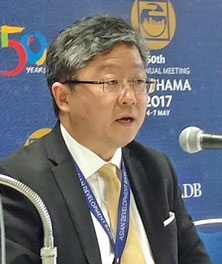ADB meet begins today amid new challenges
 YOKOHAMA, (Japan) May 03: The Asian Development Bank (ADB) is set to sit for a landmark meeting here today (Thursday) amid geopolitical tensions brewing at the backyard and protectionist waves sweeping the world over.
YOKOHAMA, (Japan) May 03: The Asian Development Bank (ADB) is set to sit for a landmark meeting here today (Thursday) amid geopolitical tensions brewing at the backyard and protectionist waves sweeping the world over.
A broiling geopolitical strain between the United States (US) and North Korea already triggers tensions in the Korean peninsula and the adjoining major Asian countries. The protectionist waves in the global north, in the US to be precise, cast uncertainty on multilateral trade regime.
Amidst such an ambience of uncertainty, Japan is hosting the 50th annual meeting of the Board of Governors of the Asian Development Bank (ADB) which formally starts Thursday (today).
Besides, the emergence of the China-led Asian Infrastructure Investment Bank (AIIB) and Japan's strong endorsement of the initiative on the eve of the meeting show that after five decades of continued operation, the ADB itself is now faced with new challenges.
In fact, Bank of Japan Governor Haruhiko Kuroda Tuesday termed the AIIB 'positive for the regional economy' and said the ADB along with the World Bank is not able to fulfil the financing demand for infrastructure construction in the region.
The ADB, however, doesn't find anything worrisome or that much challenging for its existence and operations. At a media briefing Wednesday, Dr Yasuyuki Sawada, its Chief Economist, rather welcomed the AIIB as a partner for filling the gap in infrastructure financing in the region.
"AIIB has already joined with ADB to co-finance development projects," he said while replying to a question at the briefing. So far, the China-led bank is financing only two projects in Bangladesh and Pakistan and also one in Georgia is in pipeline.
Under the theme 'Building Together the Prosperity of Asia', this year's ADB annual meeting is focusing on the region's growing need for infrastructure as a critical sector towards achieving sustainable and inclusive development.
Regarding the uncertainty over multilateral trade regime and its impact on the growth of Asian countries, Dr Sawada opined that he doesn't find anything much alarming for the region as there is no concrete step or programme taken by the United States or Europe affecting Asia.
He, however, said due to policy uncertainty, there are some pessimistic sentiments on investment and consumption.
Dr Sawada reaffirmed ADB's commitment to trade openness or trade liberalisation as it is supportive for growth and development.
The flagship Governors' Seminar on Friday will discuss reforms in trade, investment, and finance, as well as lessons learned from the past 50 years of development in the continent.
Portraying the growth prospects of Asia, Dr Yasuyuki Sawada also lauded growth story of Bangladesh. "Bangladesh has been achieving stronger growth rate for the last one decade which is closed to 7.0 per cent," he said to a question during the briefing.
The growth rate will be 6.9 per cent in the current fiscal year, as projected by the ADB in its annual development outlook released last month.
He attributed the consistent performance of the country's readymade garment (RMG) industry as major driver of the growth.
"Despite Rana Plaza collapse and some political instability, the RMG export is robust," he said.
Dr Sawada also mentioned that rising wages in China opened better opportunities for countries like Bangladesh and Vietnam.
"As China is shifting its export-oriented production base from lower-end to higher-end and also focusing more on domestic market, Bangladesh and Vietnam, engaged in labour-intensive manufacturing, will be able to enhance their export markets," he said.
Bangladesh is currently the second-largest exporter of clothing on the global market after China while Vietnam is gradually expanding its exports.
More than 5,000 delegates also started to arrive in Yokohama, the port city of Japan which is hosting the annual event of the regional bank for the fifth time since the inaugural meeting in Tokyo in November 1966.
The delegates include finance and development ministers, central bank governors, other senior government officials, business executives, journalists, academics, and representatives from civil society, development organizations, and youth from the Asia-Pacific region and also from North America and Europe.
Delegates are expected to pass some busy time on May 04-07 for the main official meeting and related sessions. Important sideline activities, however, started already.
Bangladesh Finance Minister AMA Muhith is scheduled to arrive in Yokohama this (Thursday) morning. He is likely to hold a meeting with ADB President Takehiko Nakao in the afternoon.
The ADB president also registered his participation Wednesday as a symbolic gesture to demonstrate the importance of the event which is going to take place at the official meeting venue Pacifico Yokohama
Other Posts
- Eurozone economy gets strong start
- Syed Habib Hasnat, Additional Managing Director of First Security Islami Bank Ltd, poses with the participants of 22nd Foundation Training Course at the bank training institute in the city on Saturday. Md Mustafa Khair, DMD of the bank, Md Ataur Rahman, P
- BB to probe siphoning off Tk 730b from BD’
- Remittance rises slightly in April
- Bangladesh Bank to investigate GFI claims of $75 billion lost to money smuggling
- RAKUB to go online by June
- Asian Development Bank to double its funding on water security
- Ahmed Kamal Khan Chowdhury, Managing Director of Prime Bank, inaugurating the commercial operation of Anwar Auto Rice Mill (Unit-2) at Chapai Nawabganj on Wednesday. Abdul Wahed, Former President, Chamber of Commerce & Industries, Chapai Nawabgonj, Md. Ra
- Malek Mollah, Director of Al-Arafah Islami Bank Limited, inaugurating 'Service Month 2017' from 2nd to 31st May 2017 at its Motijheel Branch in the city on Wednesday. Kazi Towhidul Alam, Deputy Managing Director of the bank was also present.




Comments